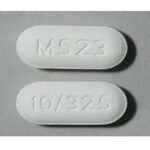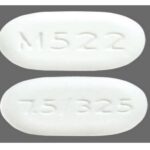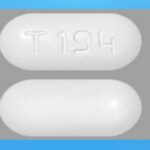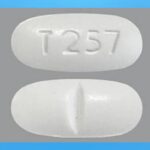TEC 30 Pill: Uses, Dosage, Side Effects, Addiction
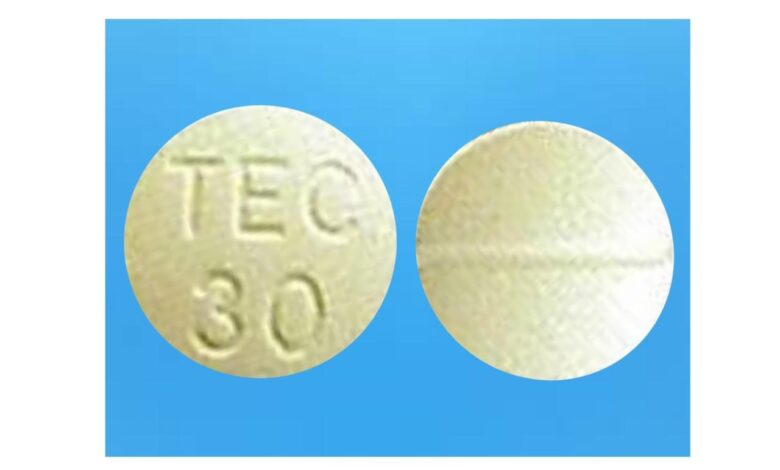
TEC 30 pill is a generic Canadian medication containing acetaminophen 300 mg and codeine 30mg. Acetaminophen and codeine combinations like TEC 30 pills are used to relieve mild to moderate pain.
Acetaminophen is used to relieve pain and reduce fever in patients. It does not become habit-forming when taken for a long time. But acetaminophen may cause other unwanted effects when taken in large doses, including serious liver damage. Although rare, use of acetaminophen has been reported to lead to liver transplantation and death, usually at high doses and when multiple acetaminophen-containing products have been used.
Codeine belongs to the group of medicines called narcotic analgesics (pain medicines). It acts on the central nervous system (CNS) to relieve pain. When codeine is used for a long time, it may become habit-forming, causing mental or physical dependence. However, people who have continuing pain should not let the fear of dependence keep them from using narcotics to relieve their pain. Mental dependence (addiction) is not likely to occur when narcotics are used for this purpose. Physical dependence may lead to withdrawal side effects if treatment is stopped suddenly. However, severe withdrawal side effects can usually be prevented by gradually reducing the dose over a period of time before treatment is stopped completely.
How should I use TEC 30 pills?
Take TEC 30 pill only as directed by your doctor. Do not take more of it, do not take it more often, and do not take it for a longer time than your doctor ordered. This is especially important for elderly patients, who may be more sensitive to the effects of pain medicines. If too much of this medicine is taken for a long time, it may become habit-forming (causing mental or physical dependence) or cause an overdose. Also, large amounts of acetaminophen may cause liver damage if taken for a long time.
Read and follow these instructions carefully. Read it again each time you refill your prescription in case there is new information. Ask your doctor if you have any questions.
Carefully check the labels of all other medicines you are using, because they may also contain acetaminophen. It is not safe to use more than 4 grams (4,000 milligrams) of acetaminophen in one day (24 hours), as this may increase the risk for serious liver problems.
The dose of TEC 30 pill will be different for different patients. Follow your doctor’s orders or the directions on the label. The following information includes only the average doses of this medicine. If your dose is different, do not change it unless your doctor tells you to do so.
The amount of TEC 30 pill that you take the number of doses you take each day, the time allowed between doses, and the length of time you take the medicine depend on the medical problem for which you are using the medicine.
What if I miss a dose?
If you miss a dose of this medicine, take it as soon as possible. However, if it is almost time for your next dose, skip the missed dose and go back to your regular dosing schedule. Do not double doses.
What are the possible side effects of TEC30 pills?
Along with its needed effects, TEC 30 pill may cause some unwanted effects. Although not all of these side effects may occur, if they do occur they may need medical attention.
Check with your doctor immediately if any of the following side effects occur:
More common
- Difficult or trouble breathing
- irregular, fast or slow, or shallow breathing
- pale or blue lips, fingernails, or skin
Incidence not known
- Black, tarry stools
- bleeding gums
- blood in the urine or stools
- cough
- difficulty with swallowing
- dizziness
- fast heartbeat
- fever with or without chills
- general feeling of tiredness or weakness
- hives, itching, skin rash
- hoarseness
- lower back or side pain
- painful or difficult urination
- pinpoint red spots on the skin
- puffiness or swelling of the eyelids or around the eyes, face, lips, or tongue
- sore throat
- sores, ulcers, or white spots on the lips or in the mouth
- tightness in the chest
- unusual bleeding or bruising
- unusual tiredness or weakness
Get emergency help immediately if any of the following symptoms of overdose occur:
Symptoms of overdose
- Bloody or cloudy urine
- chills
- constricted, pinpoint, or small pupils (black part of the eye)
- dark urine
- headache
- increased sweating
- light-colored stools
- loss of appetite
- loss of consciousness
- nausea
- seizures
- stomach pain
- sudden decrease in the amount of urine
- unpleasant breath odor
- vomiting
- vomiting of blood
- yellow eyes or skin
Some side effects may occur that usually do not need medical attention. These side effects may go away during treatment as your body adjusts to the medicine. Also, your health care professional may be able to tell you about ways to prevent or reduce some of these side effects. Check with your health care professional if any of the following side effects continue or are bothersome or if you have any questions about them:
More common
- Drowsiness
- lightheadedness
- relaxed and calm feeling
- sleepiness
Incidence not known
- Difficulty having a bowel movement
- false or unusual sense of well-being
Other side effects not listed may also occur in some patients. If you notice any other effects, check with your healthcare professional.
Call your doctor for medical advice about side effects. You may report side effects to the FDA at 1-800-FDA-1088.
Storage
Store the medicine in a closed container at room temperature, away from heat, moisture, and direct light. Keep from freezing.
Keep out of the reach of children.
Acetaminophen and codeine combination oral solution or tablet can cause serious unwanted effects or fatal overdose if taken by children, pets, or adults who are not used to strong narcotic pain medicines. Make sure you store the medicine in a safe and secure place to prevent others from getting it.
Drop off any unused narcotic medicine at a drug take-back location right away. If you do not have a drug take-back location near you, flush any unused narcotic medicine down the toilet. Check your local drug store and clinics for take-back locations.

